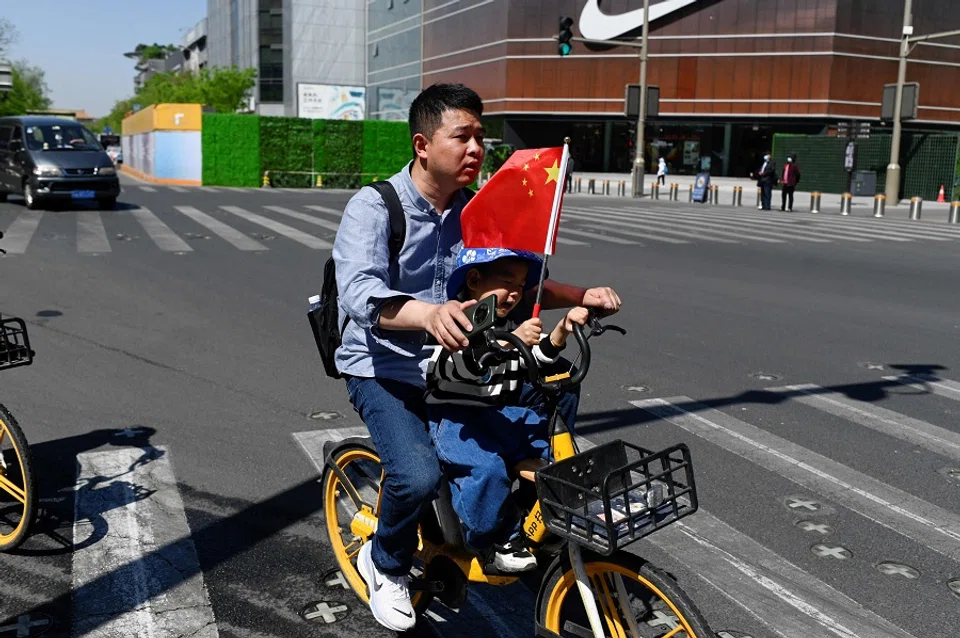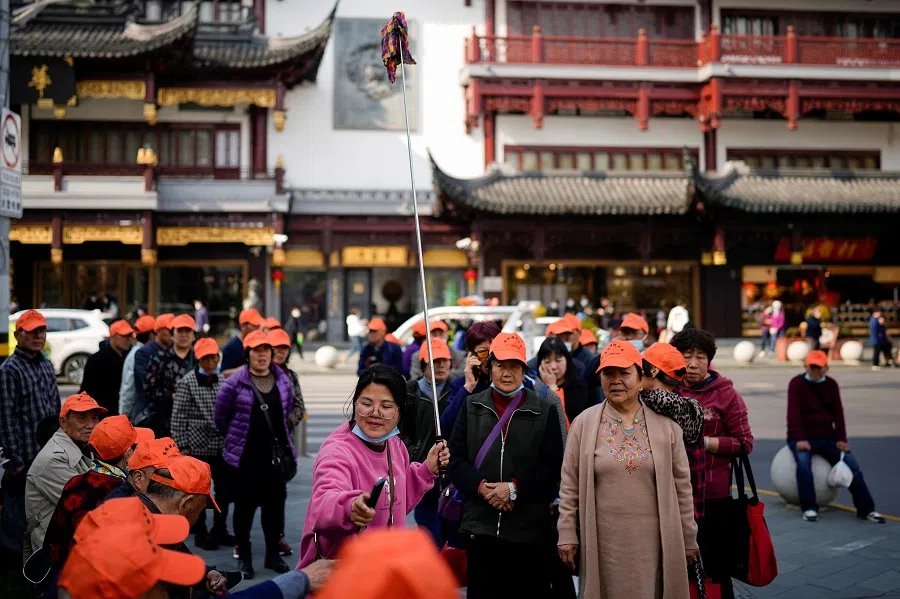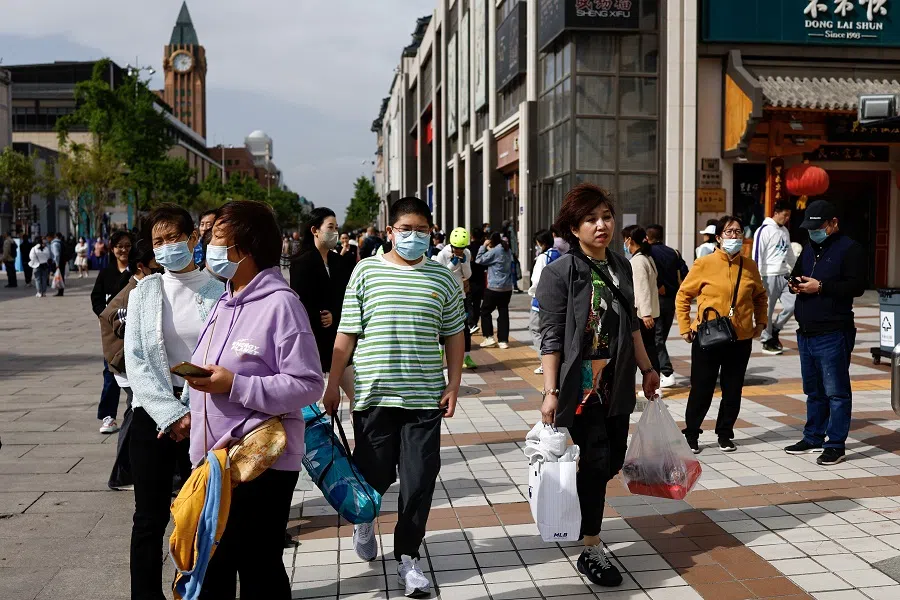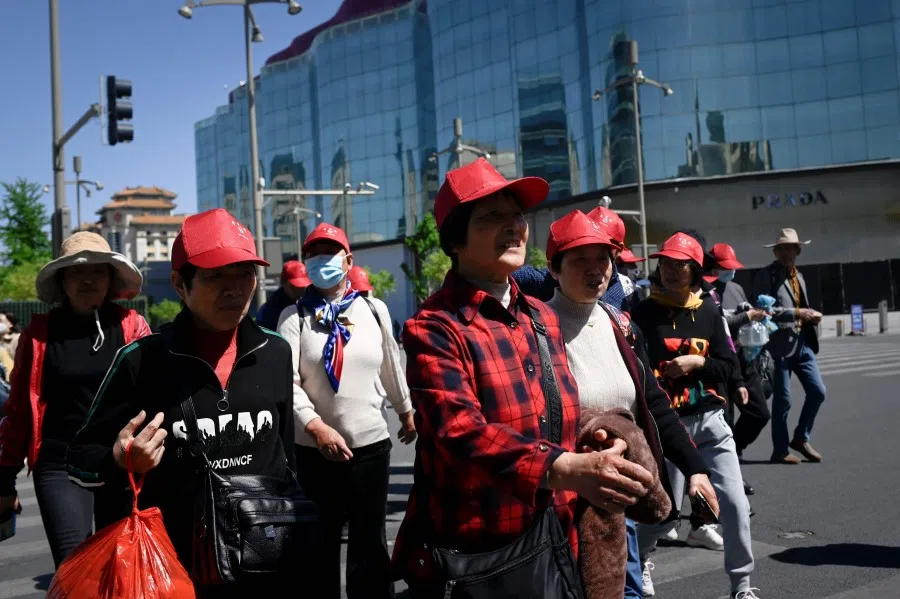China's first quarter figures positive, but pandemic leaves a long shadow
While China's better-than-expected first quarter economic figures are encouraging, it cannot be denied that three years of pandemic measures and its aftermath have dealt a blow to China's economy. Managing economic recovery while solving underlying structure issues will be a challenge in the road ahead, says Zaobao correspondent Yang Danxu.

On 18 April, China released its first first-quarter economic data of the post-pandemic era, which was a mixed bag.
The good news is that China's economy rebounded significantly, growing 4.5% year-on-year in the first quarter of 2023. The growth rate exceeded many projections, illustrating that China's economic recovery is on track.
From China's three-year-long "zero-Covid" policy being lifted last December to border controls being removed in January, much has happened in just a few months.
China's better-than-expected first quarter economic results signals that the country is set to meet its official growth target this year.
Since March, people have been flocking to tourist attractions again, and there have been snaking queues forming outside restaurants. When I was on a business trip to Guangzhou a while back, I noticed that the flight and hotel prices had risen absurdly. Just this weekend, a friend reposted the image of posters telling people to wear masks being taken down. The comment said it all: "The end of an era." All this reminds us that China has emerged from the pandemic and economic life is returning to normal.
China expected to improve global economy this year
China's better-than-expected first quarter economic results signals that the country is set to meet its official growth target this year. This is a boon to the world at a time when the global economic outlook is bleak.
... there has been a stream of multinational corporation executives visiting China, one after another, which seems as if the outside world is optimistic about the prospects of the Chinese market as well.

According to the latest forecast of the International Monetary Fund (IMF), the global growth outlook this year may be the worst since 2001 except for the financial crisis in 2008 and the outbreak of the pandemic in 2020. IMF Managing Director Kristalina Georgieva predicts that China will contribute about one third of global growth this year.
Over the past few months, there has been a stream of multinational corporation executives visiting China, one after another, which seems as if the outside world is optimistic about the prospects of the Chinese market as well.
For instance, under the spectre of China-US technological and economic decoupling, Patrick Gelsinger, the newly appointed CEO of US semiconductor titan Intel, visited Beijing last week in a vote of confidence for China. He firmly reiterated the important role that China plays in Intel's business strategy.

Before this, Apple CEO Tim Cook, Qualcomm president Cristiano Amon, Dutch lithography equipment giant ASML Global president Peter Wennink, and Samsung Electronics executive chairman Lee Jae-yong had already visited China one after the other in March, hoping to seize huge opportunities in the massive Chinese market.
Youth unemployment and decreased consumer spending
Even so, it is difficult to overcome the repercussions of the pandemic which has hit the Chinese economy hard in just a few months. Some analysts remain cautious about China's sustained economic recovery because of this.
One such repercussion is the employment issue. Latest statistics show that while the surveyed urban unemployment rate fell to 5.3% in March from 5.6% in February, youth unemployment rose for a third straight month, with the surveyed jobless rate among those aged 16 to 24 hitting 19.6% in March, second only to the record high of 19.9% last July.
... employees who have lost their jobs, small business owners whose ventures have failed, and university graduates who cannot find jobs are flooding the market with riders...

An article posted on the public WeChat account "Everyday People" (每日人物) said food delivery used to be a job with no entry requirements, and one would definitely be able to earn a living as long as one was willing to put in the hard work; but now, employees who have lost their jobs, small business owners whose ventures have failed, and university graduates who cannot find jobs are flooding the market with riders, so that this readily available, equal opportunity job will soon lose its significance. While the article only featured food delivery, it does give a glimpse into China's job market, especially the realities of the employment environment for young people.
The tough employment environment has affected people's ability and willingness to spend. In-person spending - long suppressed due to the pandemic - has been recovering, but recovery in consumption of durable goods has not been strong, as more Chinese are choosing to save rather than spend. Figures announced in early April by the People's Bank of China show that when it comes to willingness to spend, save and invest, 58% of respondents are inclined to save more. While this is 3.8 percentage points lower than the record high in the previous quarter, it is still high.

Chinese investment confidence - which took a heavy hit over the past few years due to the pandemic and various regulatory measures - also needs a boost. In the first quarter of this year, investments among the Chinese only grew slightly by 0.6%. While there are signs of stabilising property prices, investments by property developers in the first quarter fell by 5.8% year-on-year, indicating that companies face pressures of drying cash flow as well as debt and breach of contract, and there is no immediate impetus to obtain land and start new projects as the economy starts to warm up.
Structural issues persist
Also, some of China's structural economic problems worsened during the pandemic, and this is like a sharp sword dangling above. Looking at the issue of debt among local governments, over the three years of the pandemic, economic growth slowed and income from land sales dropped, coupled with increased expenses due to pandemic controls, so that there was a worsening problem of local governments spending more than they earned. A recent report by an official think tank in Guizhou province revealed that some governments there were facing a severe and urgent debt issue that they were unable to effectively resolve on their own.
... three years of the pandemic has hurt China's economy, exacerbating some structural problems and revealing some issues that were easily concealed by rapid development, and making them more urgent.

China has a decent economic foundation. After all, it has a huge consumer market, and in the decades since reform and opening up, its rapid development has been amazing. So, when China opened up its borders, emerged from the pandemic, and began to restore economic and social order, the world had positive expectations for China.
But it is a fact that three years of the pandemic has hurt China's economy, exacerbating some structural problems and revealing some issues that were easily concealed by rapid development, and making them more urgent. Having to resolve the aftermath of the three-year pandemic while solving years of structural problems, while facing a less favourable international economic environment and external demand - it is still a long and difficult road to the sustainable recovery of China's economy.
This article was first published in Lianhe Zaobao as "喜忧参半的中国经济".
Related: Politics a threat to China's economy | Chinese netizens debate: Should China abandon the market economy for a 'people-oriented' economy? | Dual circulation strategy revisited: China deepens integration with the global economy | Ten years of political intervention: China's economy at a crossroads



![[Big read] When the Arctic opens, what happens to Singapore?](https://cassette.sphdigital.com.sg/image/thinkchina/da65edebca34645c711c55e83e9877109b3c53847ebb1305573974651df1d13a)
![[Video] George Yeo: America’s deep pain — and why China won’t colonise](https://cassette.sphdigital.com.sg/image/thinkchina/15083e45d96c12390bdea6af2daf19fd9fcd875aa44a0f92796f34e3dad561cc)
